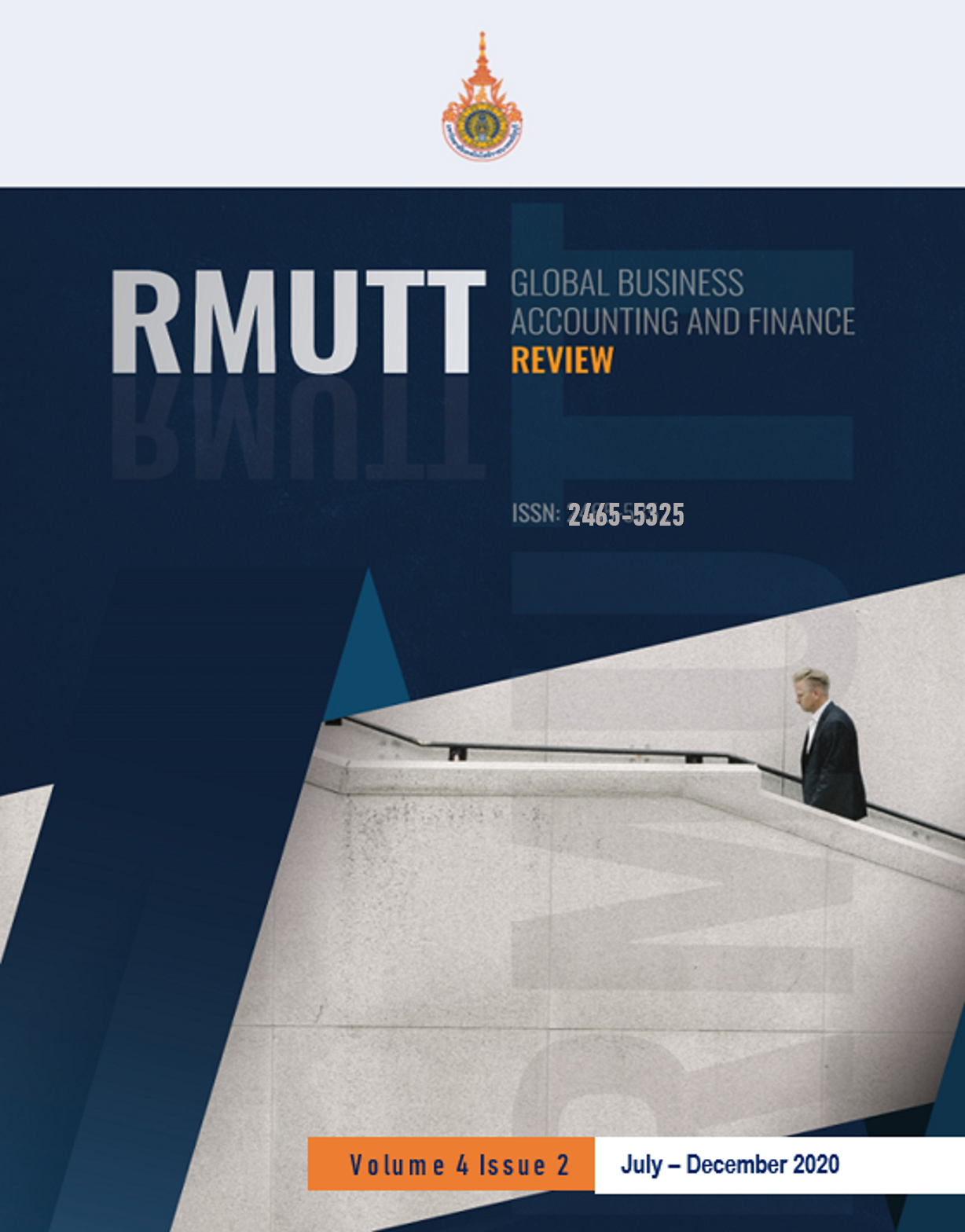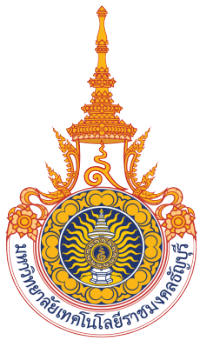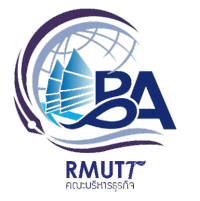CREATING EMPLOYEE WORKING SKILLS AND PERFORMANCE THROUGH ORGANIZATIONAL TRAINING PRACTICES IN ABC TIRE MANUFACTURING COMPANY
Keywords:
Employee Working Skills, Employee Work Performance, Organizational Training Practices, Tire Manufacturing CompanyAbstract
This research aimed at studying the effects of organizational training practices on creating employee working skills and employee performance in ABC Tire Manufacturing Company, which it is located in Pathum Thani Province. The samples were of 400 employees working in ABC Tire Manufacturing Company in Pathum Thani Province. The questionnaires were used to collect the data with the purposive sampling and convenient sampling methods. Data analysis consisted of descriptive statistics including frequency, percentage, mean and standard deviation and inferential statistics including structural equation model (SEM). The results showed that most of the respondents were male (366 persons or 91.5%), aged between 21-30 years old (120 persons or 30.0%) and between 41 – 50 years old (120 person or 30%), graduated lower than bachelor's degree (288 persons or 72.0%), worked as operational staff (330 persons or 82.5%), worked for 6 – 10 years (138 persons or 34.5%), and earned between 25,001 - 35,000 baht (138 persons or 34.5%), respectively. The employees had opinion related organizational training practices, working skills and performance in high level. The SEM revealed that organizational training had a direct effect on working skills, managing skills, and leading skills and an indirect effect on employees’ performance with standardized coefficient as of
References
Ackah, D. (2014). The impact of motivation on employee performance in the manufacturing industry in Ghana. Global Journal of Management Studies and Researches, 1(5), 291-310.
Agarwal, H., & Agarwal, R. (2017). First Industrial Revolution and Second Industrial Revolution: Technological differences and the differences in banking and financing of the firms. Saudi Journal of Humanities and Social Sciences, 2(11), 1062-1066.
Arbuckle, J. L. (2011). Amos 20 user’s guide. Chicago, IL: SPSS Inc.
Chaimongkol, N., Chienwattanasook, K., Onputtha, S., Sookwilai, N., & Pongwang, N. (2018). Employees’ Job Satisfaction and Employees’ Desirable Behavior Affecting Employees’ Work Performance: A Case of Christiani & Nielsen (Thai) Public Company Limited. Journal of Interdisciplinary Research: Graduate Studies, 7(2), 105-117.
Hajiar, S. T. (2014). A statistical study to develop a reliable scale to evaluate instructors within higher institution. WSEAS Transactions on Mathematics, 13, 885-894
Hameed, A., & Waheed, A. (2011). Employee development and its affect on employee performance a conceptual framework. International journal of business and social science, 2(13), 224-229.
Hans, V. B. (2019). Global Business and Cross-Cultural Diversity: Globalisation and Business Changes and Values. NOLEGEIN-Journal of Global Marketing, 18-31.
Hills, R. L. (1970). Sir Richard Arkwright and his patent granted in 1769. Notes and Records of the Royal Society of London, 24(2), 254-260.
Hooper, D., Coughlan, J., & Mullen, M. (2008). Structural equation modelling: Guidelines for determining model fit. Electronic Journal of Business Research Methods, 6(1), 53-60.
Ipe, M. (2003). Knowledge sharing in organizations: A conceptual framework. Human resource development review, 2(4), 337-359.
Katz, R. L. (1974). Skills of an effective administrator. Harvard Business Review, 52(5), 90-102.
Nda, M. M., & Fard, R. Y. (2013). The impact of employee training and development on employee productivity. Global journal of commerce and management perspective, 2(6), 91-93.
Neawchumpa, N., Ponathong, C., & Skulkhu, J. (2016). A Factor Analysis of Scientific Attitude of Science Students of Public Universities in Bangkok. Veridian E-Journal, Silpakorn University, 9(3), 1676-1691.
Ongori, H., & Nzonzo, J. C. (2011). Training and development practices in an organisation: an intervention to enhance organisational effectiveness. International Journal of engineering and management sciences, 2(4), 187-198.
Pattanaik, B. K, Mishra, S. & Dash M. (2017). Training for Development: A Comparative Analysis of Employees on Service and Industrial Sector. International Journal of Economic Research, 14(10), 1-5.
Piñol, T. C., Porta, S. A., Arévalo, M. R., & Minguella-Canela, J. (2017). Study of the training needs of industrial companies in the Barcelona Area and proposal of Training Courses and Methodologies to enhance further competitiveness. Procedia Manufacturing, 13, 1426-1431.
Rodriguez, J., & Walters, K. (2017). The importance of training and development in employee performance and evaluation. World Wide Journal of Multidisciplinary Research and Development, 3(10), 206-212.
Salas, E., Tannenbaum, S. I., Kraiger, K., & Smith-Jentsch, K. A. (2012). The science of training and development in organizations: What matters in practice. Psychological science in the public interest, 13(2), 74-101.
Sukortpromme, S., Onputtha, S., & Manorah, P. (2019). Relationship between Technological Service Quality and Employees’ Work Performance: A Case of an Electronics Manufacturing Solutions Provider Located in Pathum Thani, Thailand. 8th National and 1st International Conference on Innovative Management Science for Sustainable Society on 8th February (p. 384-393). Nakhon Sawan: Nakhon Sawan Rajabhat University.
Sukortprommee, S. (2013). The Effect of Corporate Brand Personality on Customer-Contact Employee’s Prosocial Behavior and the Mediating Effect of Brand Identification in Japanese Automotive Service Sector, (Doctoral dissertation, Rajamangala University of Technology Thanyaburi)
Tabachnick, B. G., & Fidell, L. S. (2001). Using multivariate statistics (Vol. 5). Nedham Heights, MA: Allyn & Bacon.
Tann, J., & Breckin, M. J. (1978). The International Diffusion of the Watt Engine, 1775-1825. The Economic History Review, 31(4), 541-564.
Teryima, S. J., Timothy, A. T., Faajir, A., John, E., & Vivien, U. (2016). Motivational factors as determinants of employee commitment and performance enhancement in profit oriented firms: A survey of selected brewery manufacturing companies in Nigeria. International Journal of Business and Economic development, 4(2), 112-129.
Vinesh, K. (2014). Role of training & development in an organizational development. International Journal of Management and International Business Studies, 4(2), 213-220.
Yamane, Taro. (1973). Statistics: An Introductory Analysis. 3rded. New York: Harper and Row Publications.









